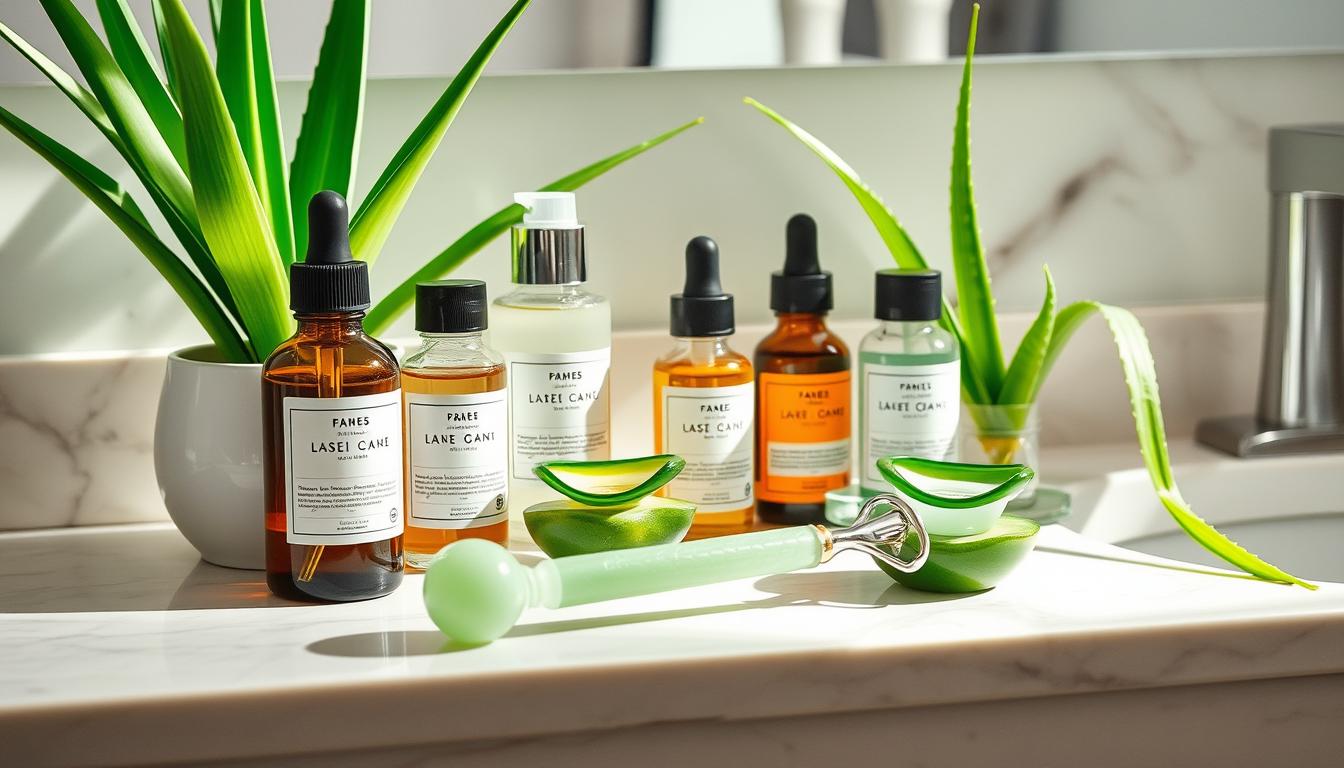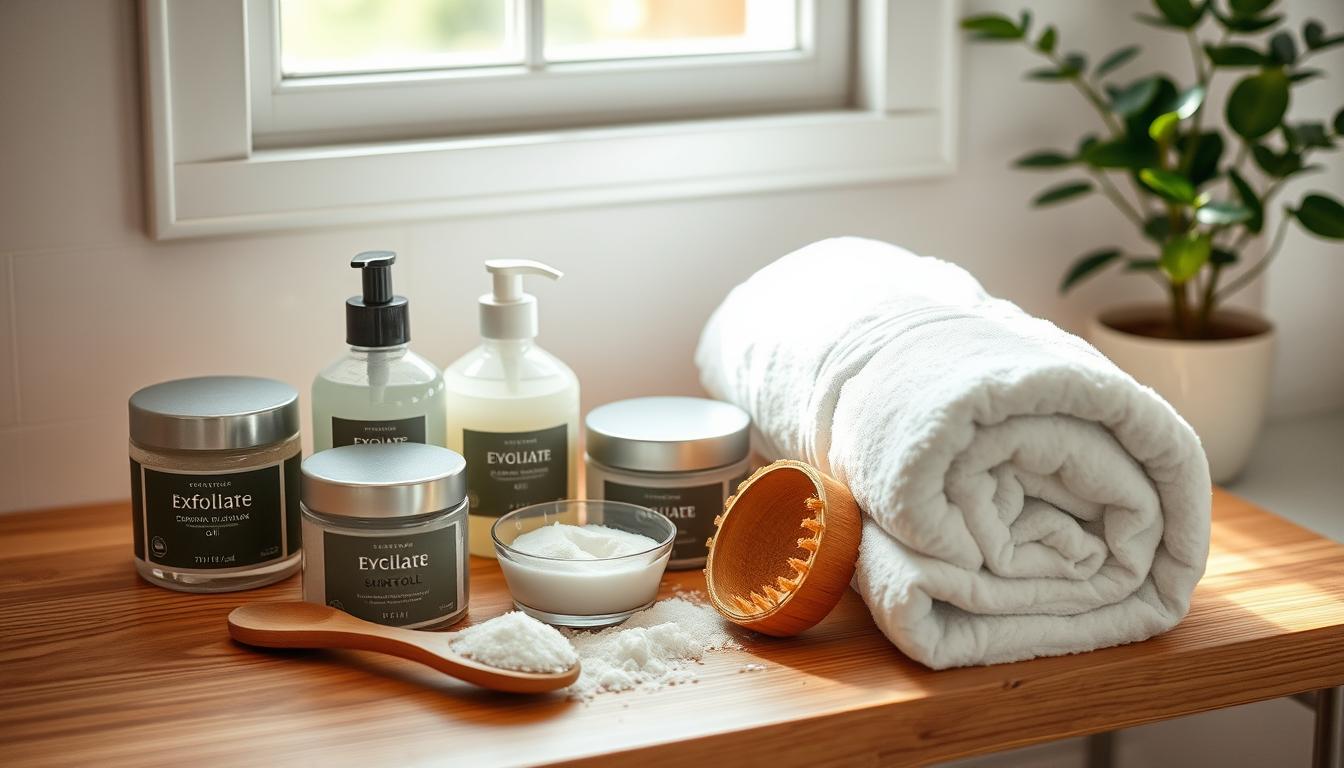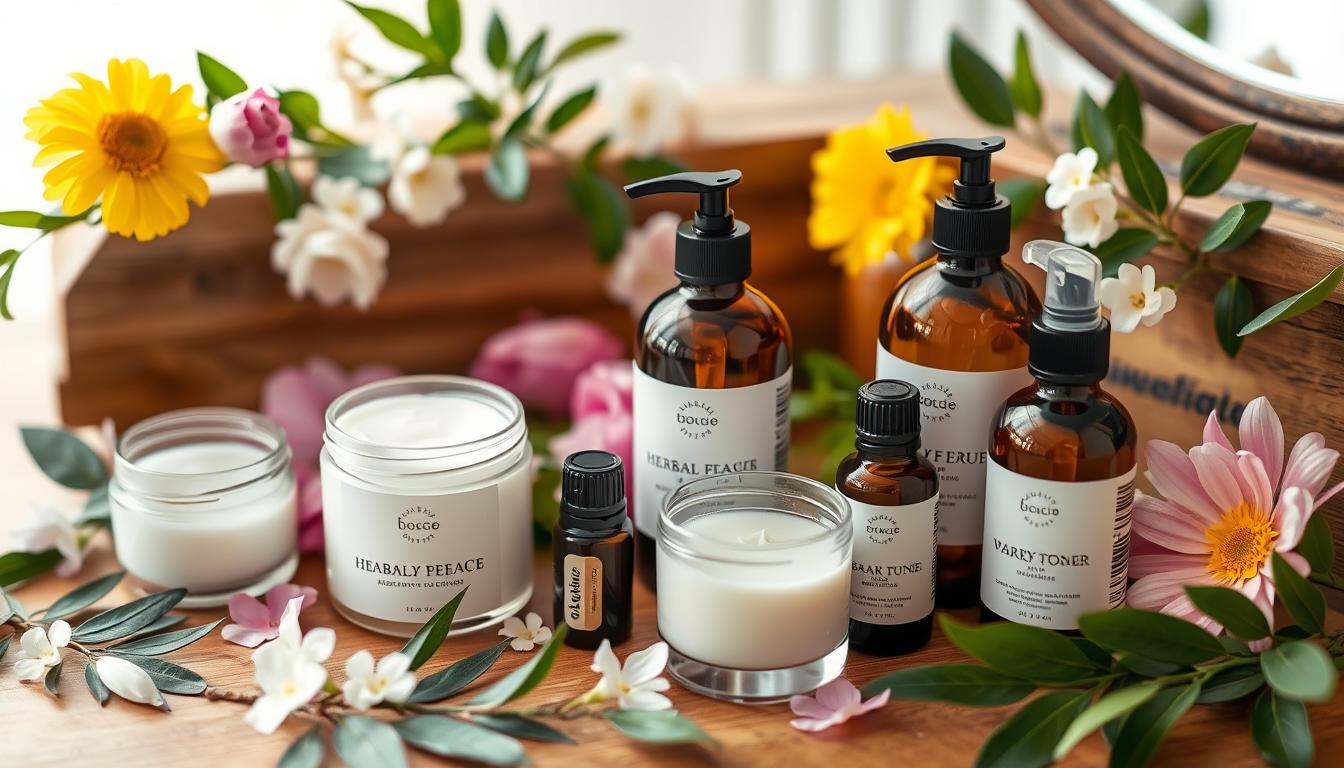Many people dream of having radiant, healthy-looking skin. But finding the right way to get it can seem hard. This guide offers expert advice and tips to help you enhance your skin’s natural beauty and health.
Learn how to understand your skin type and start a good cleansing and exfoliation routine. You’ll find out the key steps to unlock your skin’s full potential. And you’ll get the glowing skin you’ve always wanted.
Key Takeaways
- Identify your skin type to tailor your skincare regimen for optimal results.
- Incorporate a consistent cleansing routine to remove impurities and prepare your skin for further treatments.
- Exfoliate regularly to slough off dead skin cells and reveal a brighter, more radiant complexion.
- Prioritize hydration and nourishment to maintain the skin’s barrier and promote a healthy glow.
- Protect your skin from sun damage with the right sunscreen and daily sun-safe practices.
Understanding Your Skin Type
Getting healthy, glowing skin starts with knowing your skin type. Whether you have oily, dry, combination, or sensitive skin, the right organic beauty products and skincare routines can help. We’ll look at the different skin types and give tips for a skincare routine that suits you.
Identifying Different Skin Types
To figure out your skin type, think about these traits:
- Oily skin: Shiny, big pores, and lots of breakouts.
- Dry skin: Flaky, tight, and rough, with visible lines and wrinkles.
- Combination skin: Oily in the T-zone (forehead, nose, and chin) and dry on the cheeks.
- Sensitive skin: Easily irritated, red, and reacts to some products.
Tips for Caring for Oily Skin
If you have oily skin, use oil-free, non-comedogenic products. Look for salicylic acid or benzoyl peroxide in your cleanser to control oil. Use a mattifying moisturizer and a clay mask a few times a week to soak up extra oil.
Recommendations for Dry Skin
For dry skin, focus on hydration. Choose gentle, creamy cleansers and rich, nourishing moisturizers with hyaluronic acid and ceramides. Add a facial oil or serum to keep moisture in. Also, consider using a humidifier to add moisture to the air.
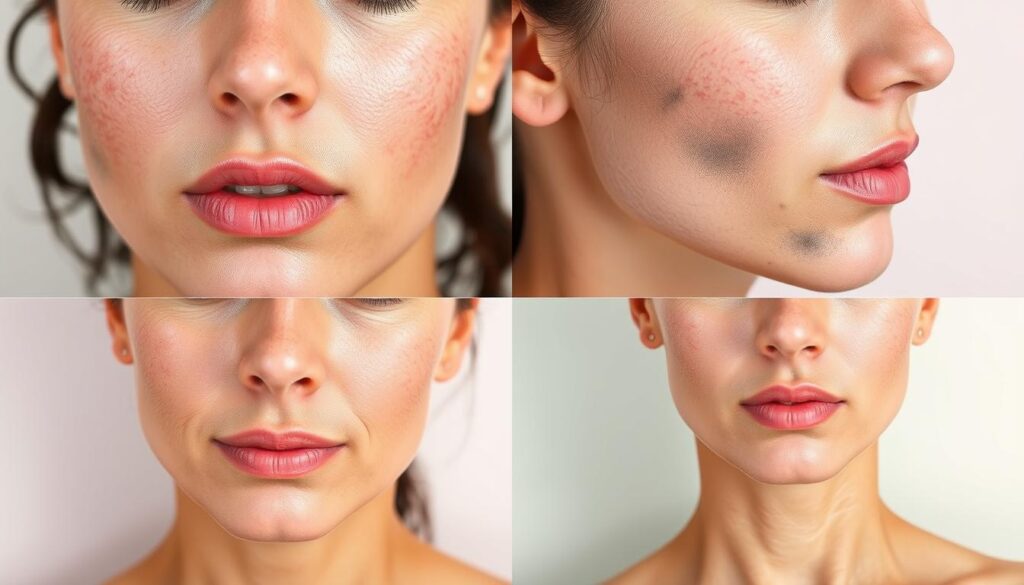
“Understanding your skin type is the first step towards achieving a healthy, radiant complexion.”
The Importance of Cleansing
Keeping up with a natural skincare routine is key for healthy, glowing skin. At the core of any good beauty routine is cleansing. It removes dirt, oil, and impurities from your skin’s surface. It also helps your skin absorb the next products in your skincare regimen better.
Choosing the Right Cleanser
Finding the right cleanser is crucial for your skin type. Whether you have oily, dry, or combination skin, there’s a cleanser for you. Choose ones that are gentle, non-irritating, and don’t have harsh chemicals that take away your skin’s natural oils.
How Often Should You Cleanse?
- Most people should cleanse their face twice a day – morning and night.
- If you have oily or acne-prone skin, cleanse more often, like after sweating or wearing makeup.
- Those with dry skin should be careful not to cleanse too much, as it can make your skin drier and more irritated.
The Benefits of Double Cleansing
Double cleansing is becoming more popular for a deeper clean. It involves using an oil-based cleanser first to remove makeup, sunscreen, and other impurities. Then, use a water-based cleanser to deeply cleanse your skin. Double cleansing leaves your skin refreshed, radiant, and ready for the next steps in your natural skincare routine.

Exfoliation: A Key to Radiance
Many of us dream of a glowing complexion. Exfoliation is key to achieving this. It removes dead skin cells, excess oil, and impurities. This leaves your skin looking brighter, smoother, and more even-toned.
Physical vs. Chemical Exfoliants
There are two main types of exfoliants: physical and chemical. Physical exfoliants, like scrubs or brushes, remove dead cells manually. Chemical exfoliants use alpha-hydroxy acids (AHAs) or beta-hydroxy acids (BHAs) to break down dead cells, revealing a brighter complexion.
How Often Should You Exfoliate?
- Most skin types should exfoliate 1-2 times a week.
- Those with sensitive skin may start with once a week and increase as needed.
- People with oily or acne-prone skin might exfoliate 2-3 times a week.
Homemade Exfoliation Recipes
Creating your own exfoliants at home can be fun and natural. Here are some ideas:
- Sugar and Honey Scrub: Mix 1 cup of white sugar, 1/4 cup of honey, and a few drops of essential oil for a nourishing scrub.
- Coffee and Coconut Oil Scrub: Combine 1/2 cup of ground coffee, 1/4 cup of coconut oil, and a pinch of cinnamon for a stimulating scrub.
- Baking Soda and Lemon Mask: Mix 1 tablespoon of baking soda with half a lemon’s juice for a brightening mask.
Skincare and beauty is a journey. Gentle exfoliation can change your look. By adding exfoliation to your skin health routine, you’ll see a new level of radiance and youth.
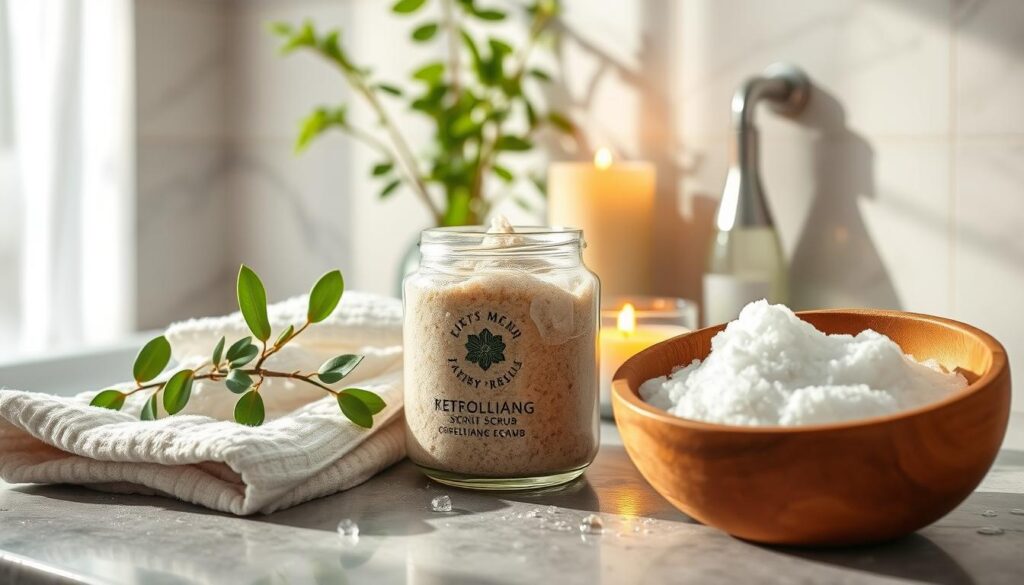
Hydration for Healthy Skin
Keeping your skin healthy starts with staying hydrated. Hydration makes your skin soft, bright, and young. It stops dryness and makes your skin look smoother.
Importance of Moisturizing
Moisturizing is key in any good beauty routine. It keeps your skin’s moisture in, stopping it from drying out. Choosing the right moisturizer for your skin type can greatly improve your organic beauty products look.
Best Moisturizers for All Skin Types
| Skin Type | Recommended Moisturizer |
|---|---|
| Dry Skin | Creamy, hydrating moisturizers with nourishing ingredients like shea butter, ceramides, and hyaluronic acid. |
| Oily Skin | Oil-free, lightweight moisturizers that won’t clog pores, such as gel-based or water-based formulas. |
| Combination Skin | Moisturizers that provide balanced hydration, addressing both the dry and oily areas of the face. |
| Sensitive Skin | Gentle, fragrance-free moisturizers that are non-irritating and soothing to the skin. |
How Water Intake Affects Skin Health
Using the right moisturizer is important, but so is drinking enough water. Drinking water keeps your skin hydrated from the inside. It makes your skin look healthy and bright.
By focusing on hydration with moisturizers and water, you can get a glowing, beautiful skin. It shows you care about your skin health and beauty routines.
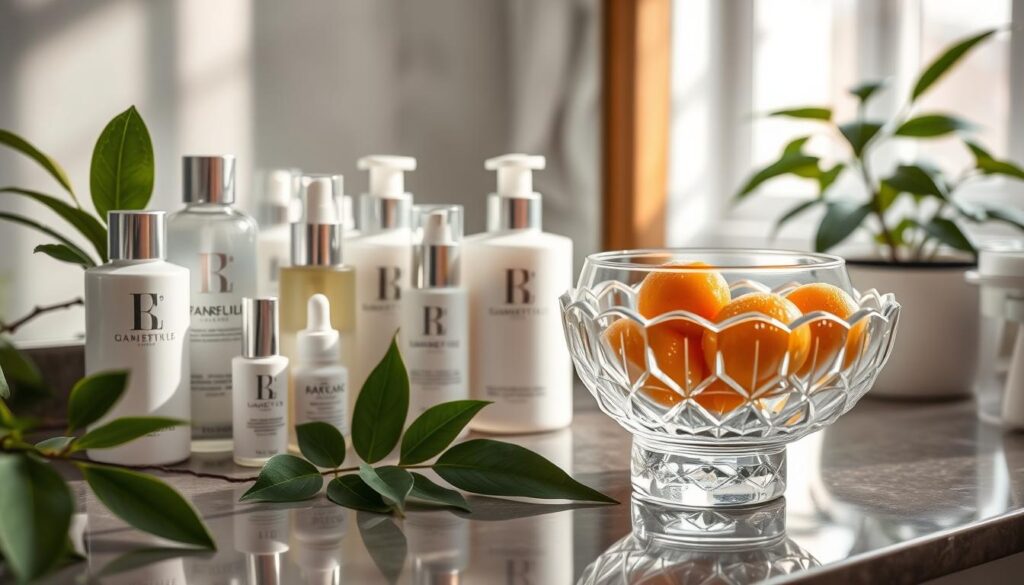
Protection from Sun Damage
Keeping your skin healthy and young is key. Protecting it from the sun’s harmful rays is essential. Knowing about SPF and picking the right sunscreen is vital. It helps prevent early aging, sun damage, and skin cancer.
Understanding SPF and Its Importance
SPF stands for Sun Protection Factor. It shows how well a sunscreen protects your skin from UV radiation. The higher the SPF, the better it guards against UVB rays, which cause sunburns.
But remember, SPF only guards against UVB rays. You also need a sunscreen that protects against UVA and UVB rays. This is called broad-spectrum protection.
Choosing the Right Sunscreen
- Think about your skin type. If you have oily skin, choose a matte, non-comedogenic sunscreen. Dry skin needs a moisturizing one.
- Go for at least SPF 30. It blocks about 97% of UVB rays.
- Make sure it’s broad-spectrum. This means it protects against UVA and UVB rays.
- If you’ll be in water or sweat, pick a water-resistant sunscreen.
Daily Sun Protection Tips
- Apply sunscreen all over your body. Use about 1 ounce, or a shot glass full.
- Reapply every 2 hours. Or more often if you’re swimming or sweating.
- Wear clothes that cover you, like wide-brimmed hats and long sleeves. Also, wear sunglasses.
- Stay in the shade when the sun is strongest, between 10 am and 4 pm.
By understanding sun protection and following these tips, you can protect your skin. This keeps it healthy and glowing.
Incorporating Serums and Treatments
Boost your skincare with serums and treatments. These powerful formulas tackle many skin issues, like aging and dullness. Learn about key ingredients and how to layer them for best results.
Key Ingredients to Look For
Some ingredients in serums and treatments are especially effective. Look for anti-aging agents like retinol, vitamin C, and hyaluronic acid. They help with fine lines, wrinkles, and dull skin.
Niacinamide and salicylic acid are great for oily skin and acne. Gentle, cruelty-free options like chamomile and green tea soothe sensitive skin.
Layering Your Skincare Products
- Apply serums before moisturizers to ensure maximum absorption and efficacy.
- Start with the lightest, most water-based formulas and gradually work your way up to thicker creams and oils.
- Allow each layer to fully absorb before moving on to the next step in your routine.
- Avoid mixing incompatible ingredients, such as retinol and vitamin C, which can potentially cause irritation.
Best Times to Apply Serums
Apply serums at the right time for best results. In the morning, use serums with vitamin C or antioxidants for protection. In the evening, use treatments like retinol or peptides for skin repair while you sleep.
“Incorporating targeted serums and treatments into your skincare routine can be a game-changer for achieving your skin goals.”
The Role of Diet in Skincare
Your diet is key to healthy, glowing skin. Certain foods and supplements can greatly benefit your skin health. Discover how the foods you eat can help you achieve a more youthful, radiant complexion.
Foods that Promote Glowing Skin
Adding nutrient-dense foods to your diet can greatly improve your skin. Some top options include:
- Avocados, rich in healthy fats, antioxidants, and vitamins C and E
- Leafy greens like spinach and kale, full of vitamins A and C, and anti-inflammatory properties
- Fatty fish such as salmon and sardines, providing omega-3 fatty acids to reduce inflammation and improve skin hydration
- Berries, known for their high antioxidant content that protects skin from environmental stressors
Supplements for Skin Health
Along with a nutrient-rich diet, certain supplements can support your skin health. Look for:
- Vitamin C, which aids in collagen production and brightens the complexion
- Vitamin E, a powerful antioxidant that helps defend against free radical damage
- Zinc, essential for wound healing and maintaining healthy skin cells
- Probiotics, which can improve gut health and have a positive impact on skin inflammation
Hydrating Foods to Consider
Staying hydrated is crucial for skin health. Certain foods can help with this. Include more water-rich options like:
- Cucumber, with its high water content and skin-soothing properties
- Watermelon, a refreshing fruit that provides both water and skin-nourishing nutrients
- Coconut water, packed with electrolytes to replenish and hydrate the skin from the inside out
By focusing on a diet rich in natural skincare-boosting foods, supplements, and hydrating options, you can nourish your skin from the inside out. This leads to a more radiant, youthful glow.
Developing a Nighttime Routine
Creating a good nighttime skincare routine is key for healthy, glowing skin. Your night routine should help your skin repair and glow in the morning. We’ll look at the must-do steps for a nourishing night, why sleep is vital, and the difference between night creams and regular moisturizers.
Steps for an Effective Night Ritual
- Double cleanse to remove makeup, dirt, and impurities.
- Apply a hydrating toner or essence to balance your skin’s pH.
- Treat your skin with a targeted serum or booster, focusing on your specific concerns.
- Seal in the benefits with a nourishing night cream or moisturizer.
- Don’t forget to gently massage your face and neck to promote lymphatic drainage.
Importance of Rest for Skin Regeneration
Your skin repairs itself while you sleep. It boosts cell turnover and collagen production, and fixes its natural barrier. Getting 7-9 hours of sleep each night is crucial for youthful-looking skin.
Night Creams vs. Regular Moisturizers
Regular moisturizers are for daily use, but night creams tackle anti-aging treatments and offer deep nourishment at night. Look for night creams with retinol, peptides, or plant oils to fight fine lines, wrinkles, and dullness. These skincare regimens help you wake up with a brighter, fresher look.
Staying Consistent with Your Regimen
Getting glowing, healthy skin is a journey, not a quick fix. It’s important to stick to your skincare routine every day. This way, you’ll see long-term results. Make a schedule that fits your life and watch your skin improve.
Creating a Skincare Schedule
Choose times each day to care for your skin. It could be in the morning or before bed. Find a routine that works for you and stick to it.
Tracking Your Skin’s Changes
Watch how your skin reacts to new products and methods. Look for improvements like fewer blemishes or a brighter look. Keeping a skincare journal helps you see patterns and make changes when needed.
When to Consult a Dermatologist
Even with a great skincare routine, sometimes you need a pro’s help. If you have ongoing skin problems or concerns, see a dermatologist. They can give you tailored advice and help you reach your skin goals.

